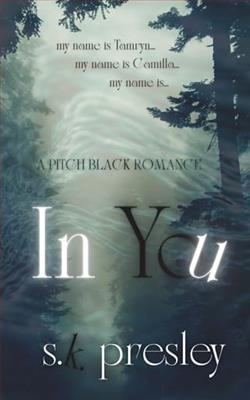Page 10 of So Far Gone
“This fire is warm,” he said.
“Warm fires are my specialty.”
While her grandfather put the clothes on the line, Leah picked up one of the spiral notebooks that were spread around everywhere. Written on the covers were what appeared to be chapter numbers and short descriptions. This one read: “Ch. 47—Vulgar Errors.” She flipped through the notebook. It appeared to be Grandpa Rhys’s thoughts on books he was reading. On the first page, she read, in his block handwriting:
InPseudodoxia Epidemica(1646, rev 5X, 1672) Browne sought to identify the “vulgar errors” of his times. This chapter proposes a new era of rational vulgarity based on our humanistic view of the environment, i.e., how philosophy, morality, wisdom, etal. failed to keep pace with scientific discovery, reflected, for instance, in Kant’s separation of nature and human experience inCritique of Practical Reason:“Two things fill the mind with ever new and increasing admiration and awe, the more often and steadily we reflect upon them: the starry heavens above me and the moral law within me.” (See also Ch. 36, ontological failures of Cartesian substance dualism.)
Kinnick finished hanging the clothes and looked back to see Leah reading one of his notebooks, her dark eyebrows knit with concentration. “Oh, those are... It’s just... That’s not...” He shifted his weight nervously. “That’s kind of a work in progress. Or”—he chuckled a little at himself—“a work in nonprogress.”
Leah set the notebook down and picked up an old hardcover book near it, whose dust jacket read:The Ethics of Ambiguity, Simone de Beauvoir. “Is this good? Simone...”
“De Beauvoir.Yes, it’s very good.”
“Boovwah.” Leah repeated it the way Rhys had pronounced it. Sheliked the cover, the title, andSimonede Beauvoirstripped across four banana-Popsicle panels, between them, a small black-and-white photo of a serious-looking woman in profile. (Perhaps she would put her picture on her own books one day.) Leah opened the book, and read a little bit, but it seemed even more technical than her grandfather’s notebook, so she closed it. “Do you have theWraith of the Kingdomseries?”
“Probably not.”
“I like to read whole series. If there’s just one book, it makes me sad when it’s over.”
“That’s reasonable.”
“How about Valerie Godwin? Do you have her books?”
“Is Valerie Godwin alive?”
“Yes. She writes about young people who are called to do special tasks by a council of elven elders.”
“Hmm... I don’t think I have that one.” Rhys gestured toward the packed shelves and tables. “These books are mostly by dead authors. Of course, they weren’t dead when they wrote them.”
“We used to have your book at home,” Asher said, looking up from the fire.
“I wasn’t dead when I wrote mine, either,” Kinnick said. And then he noted the boy’s tense. “Wait, did you say youusedto have my book? What happened to it??”
“Shane got rid of most of our books,” Leah said. “Just before we moved.”
“Your mother let him get rid ofmybook?”
Leah set Simone de Beauvoir back on the stack. “There was a committee at our new church, and they sent out a list of approved and recommended titles,” she said. “We got rid of some books then. And when we moved, we just didn’t have room for a lot of our other books. I think that’s when we got rid of yours.”
His one book,From River to Rimrock, had taken him twelve years to write. It was a series of essays about environmental degradation in theInland Northwest in the twentieth century. Published by a university press, he’d written it as a gentle call for small-scale local change, but maybe it had been too gentle, too small, too local. He’d worked on it during weekends and holidays, and its publication had been—briefly—his proudest professional moment. He did a few readings around the Northwest, and at a couple of colleges. But the thing sold all of eight hundred copies and promptly went out of print. He wondered how many even still existed.
He used to imagine that, when the last copy of his book was gone, Kinnick would be gone, too, wiped from the earth. This felt like a relief at times. The world had no use for him, or for his curious little book (and, more than likely, would have even less use for the unwieldy second book he was writing, should he ever finish it). It was a kind of delusional self-centeredness, connecting his failure as a writer to the culture’s growing rejection of science, philosophy, and reason, of basic common sense. But, of course, when he was moping around, thinking about his slim foothold in the publishing world, he didn’t consider that his daughter and his grandchildren would surely outlive his little book, that Leah and Asher might be around longer, than, say, his research on the decline of native trout populations in Inland Northwest streams, or the shortage of huckleberries in the once-purple Selkirk Mountains.
Right,he thought.We live only as long as someone remembers us. Only as long as someone cares.
A shiver went through him then, the same wave of ruefulness and contrition he’d felt before, standing on the porch, staring at these kids whom he hadn’t recognized at first, finding out that his daughter had run away, that his ex-wife was dead:What have I done?His eyes welled, and his voice cracked when he spoke: “I’m gonna go check on the car.” The kids looked up from the fire. Did they hear that break in his voice? “Make sure it starts,” he added, “so we can get to that chess tournament on time.”
Kinnick started for the door. He’d used the old ’59 Ford flatbed for a while, but it gave up the ghost six months ago, so he was back to using his car to get supplies. He’d tried to start the car two days ago and found the battery dead, so he’d dragged an extension cord down and connected a charger to the car battery posts. Rhys went outside, buttoning his chore coat as he stepped off the back porch, to where a two-track driveway curled around the house and down into two wooden doors cut into the hillside and the concrete foundation below his floor. He unlocked the padlock and swung the short doors open, revealing a five-foot-high crawl space where his old lime-green car was parked in the half-basement garage that he’d shoveled out and fortified with cinder blocks.
“What is that?”
Kinnick turned and saw Leah looking down on him, over the bank of the driveway.
“That?” Rhys turned to the car. “Is a 1978 Audi 100 GLS,” Rhys said. “Arguably, the low point in a long, proud tradition of German automotive excellence.”
“Is it a hybrid?”
“It is, actually—half car, half garbage. Carbage.” Kinnick could feel the give-and-take of spoken language coming back to him, filling his chest, like he’d come up from diving and was breathing again. And Leah—so smart, so observant, she reminded him of Bethany at that age—was already a fine conversational foil. “Has almost three hundred thousand miles on it.”















